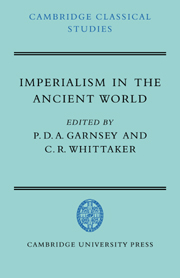Book contents
- Frontmatter
- Contents
- List of figures
- Preface
- 1 INTRODUCTION
- 2 IMPERIALISM AND EMPIRE IN NEW KINGDOM EGYPT
- 3 CARTHAGINIAN IMPERIALISM IN THE FIFTH AND FOURTH CENTURIES
- 4 SPARTAN IMPERIALISM?
- 5 THE FIFTH-CENTURY ATHENIAN EMPIRE: A BALANCE SHEET
- 6 ATHENS IN THE FOURTH CENTURY
- 7 THE ANTIGONIDS AND THE GREEK STATES, 276–196 B.C.
- 8 LAUS IMPERII
- 9 GREEK INTELLECTUALS AND THE ROMAN ARISTOCRACY IN THE FIRST CENTURY B.C.
- 10 THE BENEFICIAL IDEOLOGY
- 11 ROME's AFRICAN EMPIRE UNDER THE PRINCIPATE
- 12 JEWISH ATTITUDES TO THE ROMAN EMPIRE
- Notes
- Bibliography
- Index
6 - ATHENS IN THE FOURTH CENTURY
Published online by Cambridge University Press: 05 June 2014
- Frontmatter
- Contents
- List of figures
- Preface
- 1 INTRODUCTION
- 2 IMPERIALISM AND EMPIRE IN NEW KINGDOM EGYPT
- 3 CARTHAGINIAN IMPERIALISM IN THE FIFTH AND FOURTH CENTURIES
- 4 SPARTAN IMPERIALISM?
- 5 THE FIFTH-CENTURY ATHENIAN EMPIRE: A BALANCE SHEET
- 6 ATHENS IN THE FOURTH CENTURY
- 7 THE ANTIGONIDS AND THE GREEK STATES, 276–196 B.C.
- 8 LAUS IMPERII
- 9 GREEK INTELLECTUALS AND THE ROMAN ARISTOCRACY IN THE FIRST CENTURY B.C.
- 10 THE BENEFICIAL IDEOLOGY
- 11 ROME's AFRICAN EMPIRE UNDER THE PRINCIPATE
- 12 JEWISH ATTITUDES TO THE ROMAN EMPIRE
- Notes
- Bibliography
- Index
Summary
In the fifth century the arche stands for the imperialism of Athens in all its strength (and its weaknesses). In the fourth century one might expect the Second Confederacy to perform a like service, of offering the aids (tekmeria) through which to interpret the imperialism of this later generation of Athenians. Have they learned something? Have they forgotten anything? In the scope of this essay there would be no point, clearly, in trying to summarize the history of the Confederacy or its institutions, which have been well served by studies in detail whether of the whole or of various parts. It is a matter of focusing on one or two points of interest and of querying one or two orthodoxies, even if there is no hard evidence which refutes them. Especially, can it really be true that the Athenians not only tried but in large part contrived to repeat the ‘confederacy-to-empire’ tour de force for a few years?
The most prevalent opinion seems to be that the Athenians at heart changed little. Of Demos one could say, as of the poor prince in another context, ‘He is no better, he is much the same’. Though arche had been a thing unknown in the Greek experience before the subjugation of Naxos (para to kathestekos), and though it could be seen as at best an impropriety and at the worst a crime, still it had been a crime to be proud of, not ashamed. (So ‘Pericles’ in 430, so ‘the Mantineans’ in 418.)
- Type
- Chapter
- Information
- Imperialism in the Ancient WorldThe Cambridge University Research Seminar in Ancient History, pp. 127 - 144Publisher: Cambridge University PressPrint publication year: 1979
- 4
- Cited by

